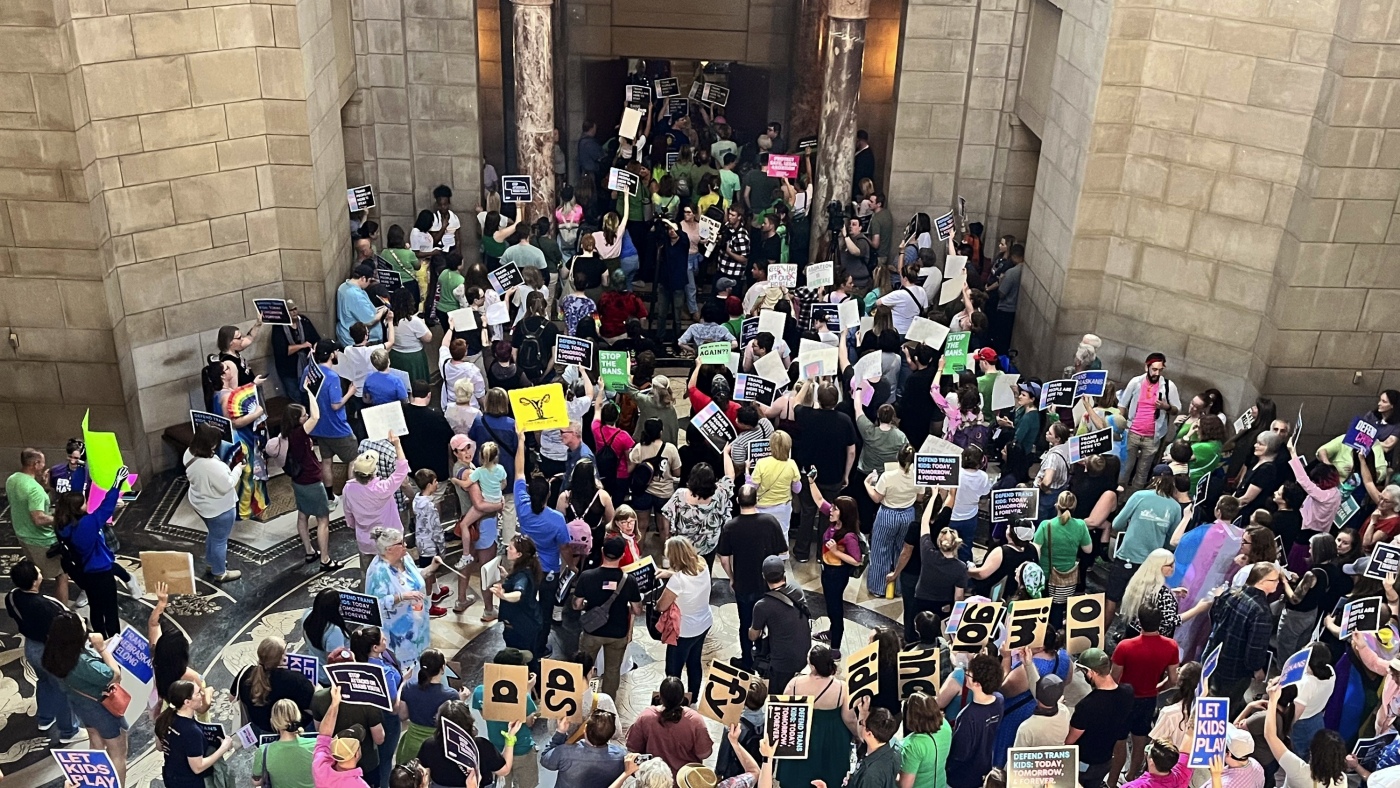Politics
Crime is a ballot 'vulnerability' for California Democrats after Schiff, Bass break-ins

A trio of crimes involving Democratic lawmakers has put the spotlight back on public safety in the Golden State, an issue on which experts warn the party’s candidates could be vulnerable in November.
In the span of a week, Los Angeles Mayor Karen Bass was the victim of a burglary at Getty House in Windsor Square, Rep. Adam B. Schiff (D-Burbank) had his suitcase stolen out of his car in the Bay Area, and a plainclothes police officer protecting San Jose Mayor Matt Mahan was punched by a pedestrian during a television interview.
All three incidents were ready-made fodder for Republican critics who often lambast California’s approach to public safety. They have also renewed concerns that how California voters think about crime could affect some Democrats in swing districts in November.
“Voters are thinking: You’ve got to be kidding me,” said Darry Sragow, a longtime Democratic strategist. “Adam Schiff isn’t safe, Karen Bass isn’t safe — if they’re not safe, who is?”
Property and violent crime rates in California both rose during the COVID-19 pandemic, but remain far below the peaks of the 1980s and 1990s. When it comes to campaigns, though, what the statistics show is less important than how voters feel, Sragow said.
Crime is “definitely one of the top issues on voters’ minds right now,” said Mark Baldassare, the survey director of the Public Policy Institute of California, or PPIC, a nonpartisan think tank that regularly surveys Californians about their views on public policy issues.
The economy, homelessness and housing affordability are still top concerns, Baldassare said, but the share of likely voters who are concerned about crime appears to be growing. In December, the PPIC found that 8% of likely voters described “crime, drugs and gangs” as the most important issue facing the state. Two months later, 12% of likely voters said that crime was the most important issue for Gov. Gavin Newsom and the Legislature to address in 2024.
Those numbers are particularly high among voters who described themselves as independents: In February, 17% of likely independent voters said crime was the most important issue, up from 8% in December.
“The thing about crime is, it doesn’t take much — it just takes one or two things that people notice and makes them scared,” Baldassare said.
Recent high-profile attacks, including the shooting of an L.A. County Sheriff’s Department deputy stopped at a traffic light in West Covina, and a spate of stabbings on the L.A. Metro system, can leave uneasy Californians wondering “whether everything is falling apart,” Sragow said.
The job of Democratic candidates, Sragow said, will be “to address how people feel, that people have to feel safe when they walk outside.” Republican challengers, he said, will try to make a case for tough-on-crime policies, crafted subtly enough to try and appeal to “disaffected independents, and maybe some Democrats.”
Some of that tough-on-crime talk is coming from Democrats too. A shift in how state lawmakers in Sacramento are talking about public safety is proof that crime is “clearly a vulnerability” for Democrats in tight races, said Rob Stutzman, a Republican strategist.
He said voters’ concerns over crime probably won’t make a difference in the Senate race, where polling shows Schiff with a commanding lead over Republican challenger Steve Garvey. But, Stutzman said, those concerns could make a difference in more competitive districts, including the handful of California swing seats for Congress that could help decide control of the House of Representatives in November.
“The pendulum is swinging, and it’s dragging them with it,” Stutzman said of Democrats.
Democrats are a ripe target, given that the party has a firm grip on political power in California. Democrats hold every statewide office and control both chambers of the state Legislature. Republicans have not won a California statewide election since 2006, when Gov. Arnold Schwarzenegger won reelection and Steve Poizner became insurance commissioner. Registered Democrats also outnumber Republicans by almost 2 to 1 in the state.
Newsom has sent dozens of California Highway Patrol officers to Oakland and to Bakersfield this year in an attempt to address rising crime rates. The governor said this week that authorities in Kern County, home to Bakersfield, have made 211 arrests, recovered 127 stolen vehicles and seized four firearms in the first six weeks of the CHP enforcement effort.
A package of bills from Assembly Democrats, endorsed by Speaker Robert Rivas (D-Hollister), are designed to address retail theft by, among other proposals, allowing restraining orders to keep people who steal away from certain stores and letting prosecutors aggregate the value of thefts across multiple incidents in determining criminal charges.
The “root cause of so much of the chaos and decay” is Proposition 47, said Yolo County Dist. Atty. Jeff Reisig in a post on the social platform X. California voters approved the ballot measure in 2014 to reclassify some felony drug and theft offenses as misdemeanors and to raise, from $400 to $950, the amount for which theft can be prosecuted as a felony.
“Many friends and family who live and work in the urban core of our big cities no longer feel safe even walking to lunch,” Reisig said after the scuffle involving the San Jose mayor’s security detail on live television. The attack, he said, was “more stark evidence that California’s urban centers have been turned into dangerous places.”
He said he hoped voters would get the chance to reform Proposition 47 in November. Mahan and San Francisco Mayor London Breed, both Democrats, have endorsed an effort to increase criminal penalties for fentanyl dealers and repeat organized retail theft rings, as well as provide mandatory treatment for drug users.

Politics
Potential Trump running mate Tom Cotton took hard look at 2024 run, but being a father came first
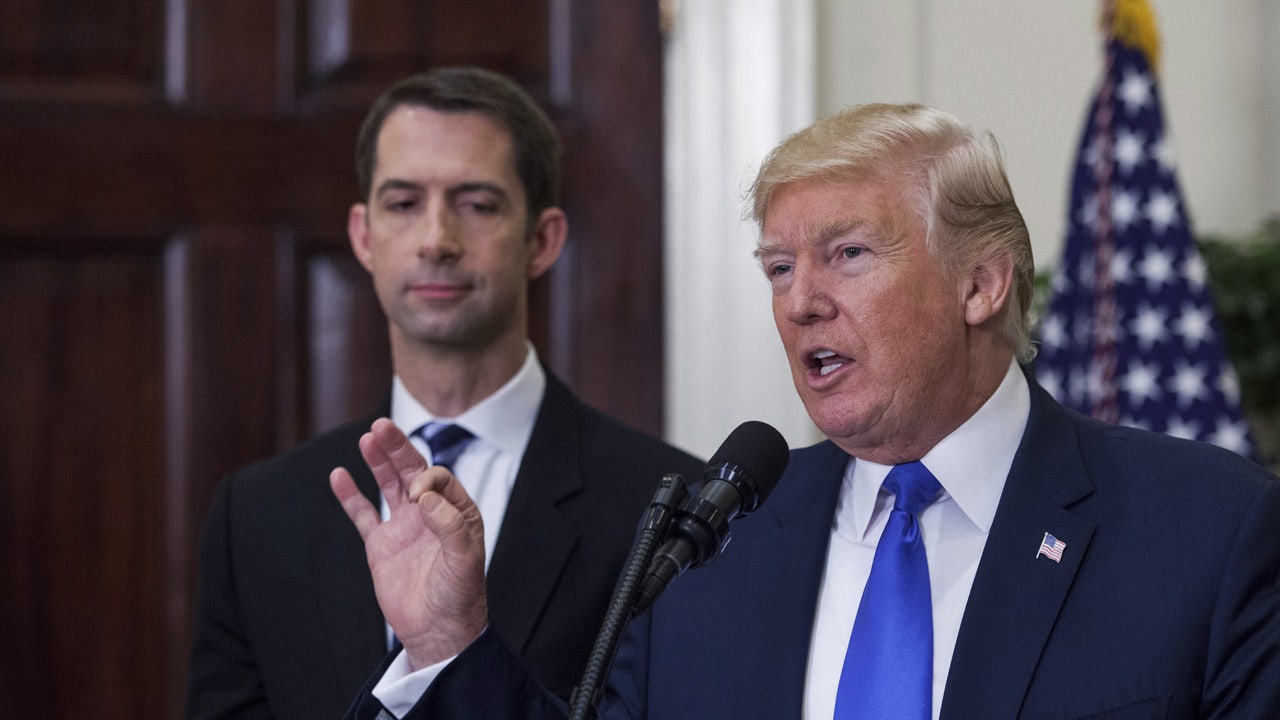
Sen. Tom Cotton of Arkansas is in the Trump running mate spotlight.
The Army veteran, who served in combat in the Iraq and Afghanistan wars before becoming a rising star in Republican Party politics, has been viewed as a potential running mate since he endorsed the former president in early January, two weeks ahead of the Iowa caucuses.
But a report last week that Cotton may be moving up on Trump’s list for the GOP’s vice presidential nominee sparked a slew of stories in recent days about the senator.
Rarely mentioned was that Cotton seriously mulled a 2024 White House run of his own before deciding against it in late 2022.
NEW CONTENDER ON TRUMP’S LIST OF POTENTIAL RUNNING MATES?
President Trump speaks while Sen. Tom Cotton listens in the Roosevelt Room of the White House, Aug. 2, 2017. (Zach Gibson/Bloomberg via Getty Images)
Cotton, who won re-election by a landslide in the 2020 Senate election in red-state Arkansas, spent plenty of time in 2021 and 2022 on the campaign trail on behalf of fellow Republicans running in the midterm elections. And those trips brought the senator multiple times to Iowa and New Hampshire, which for a half century have led off the GOP’s presidential nominating calendar.
The senator also bolstered his fundraising and political operation, and expanded his national profile with a book on military history.
WATCH WHAT SEN. TOM COTTON HAS TO SAY ABOUT SUPREME COURT JUSTICE ALITO FLAG CONTROVERSY
But days before the 2022 midterms, Cotton announced he wouldn’t run for the White House in 2024.
And in his first interview after announcing his decision, the senator emphasized why he didn’t run.
“Family was really the only consideration,” he told Fox News Digital.
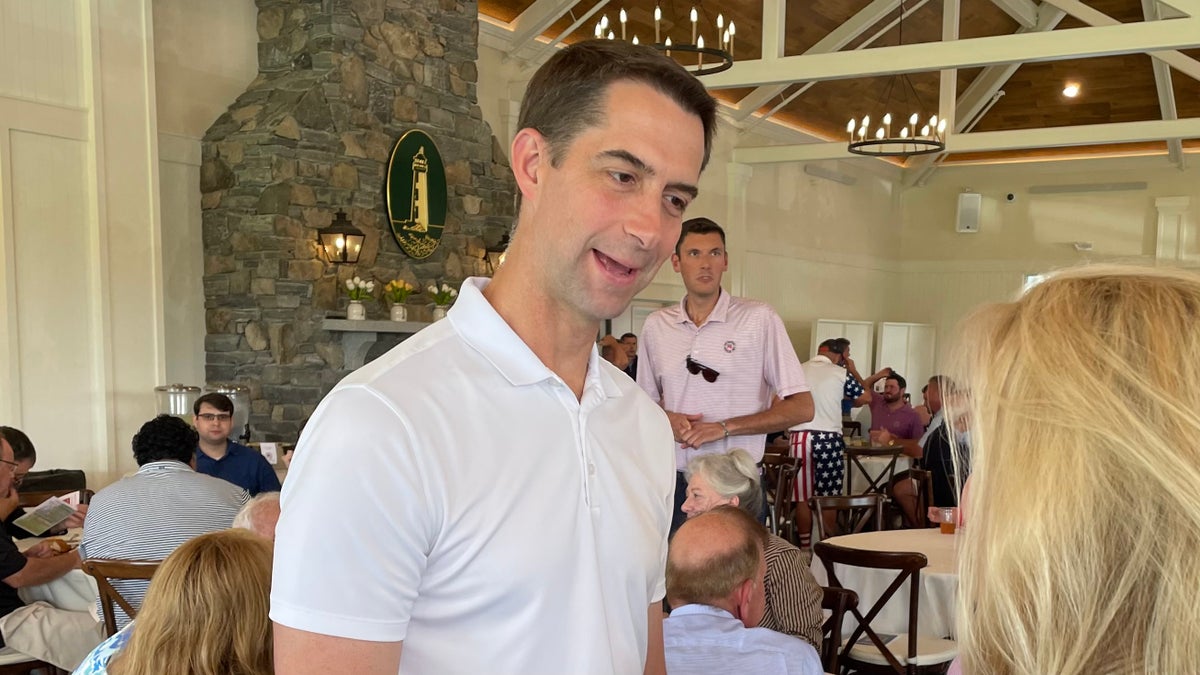
Sen. Tom Cotton of speaks with an activist at a GOP fundraiser in Rye, New Hampshire, on Aug. 16, 2022. (Fox News – Paul Steinhauser)
The now-47-year-old senator and his wife Anna are the parents of two young boys.
“My boys are age 7 and 5. They’re old enough to know that dad’s gone and be sad about it, but not old enough to understand the purpose and why it all matters and why the sacrifice is worth it,” Cotton said at the time. “I am pretty sure Republican voters can find another nominee, but I know that my sons can’t find another dad for the next two years.”
The senator added that “over the next two years my 7-year-old will learn to hit the fastball and my 5-year-old will learn to read, and I want to be there to teach them both.”
2024 WILDCARD: COULD TRUMP CRIMINAL TRIAL VERDICT ROCK THE PRESIDENTIAL ELECTION?
But Cotton left the door wide open to a future White House run, emphasizing, “this is a decision only about this 2024 race and this time for my family. We’ll make a decision about future races in the future, especially as my boys get older and understand more about why I do the work I do and what it means for them and for our country.”
And he also said at the time that he’d consider serving in a GOP administration.
“Under the right circumstances, if a Republican president asked me to consider such a job, I’d of course consider it any time a president asks one to serve the nation,” Cotton said.
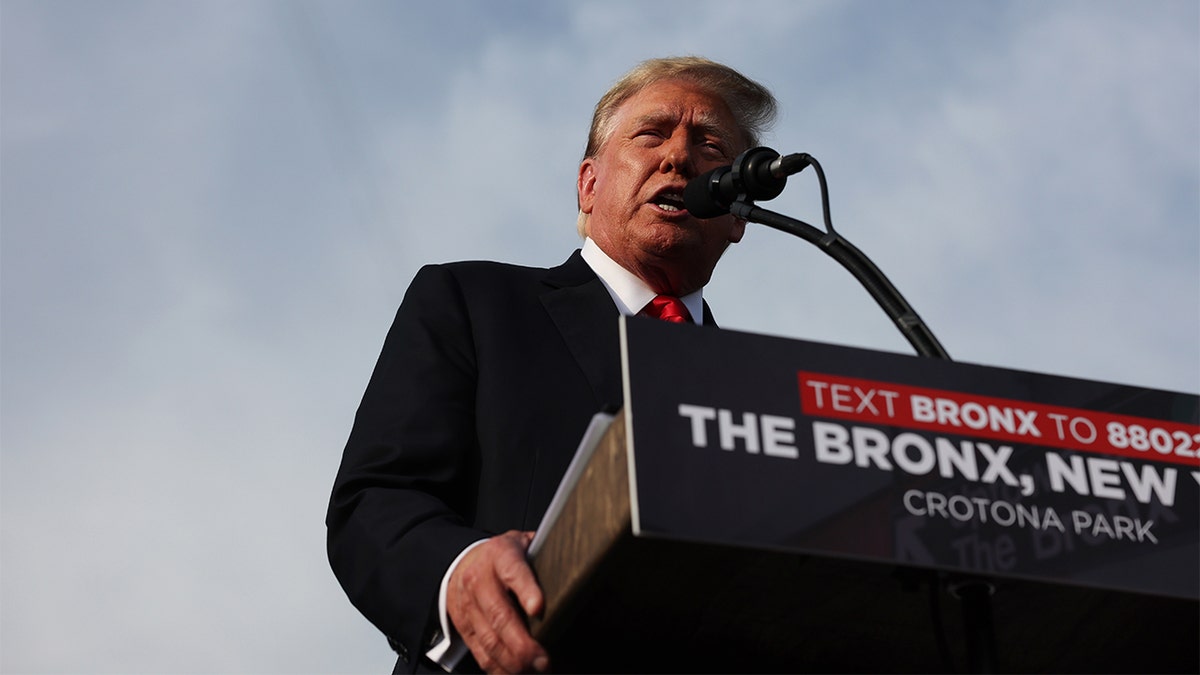
Former President Trump holds a rally in the heavily blue New York City borough of the Bronx on May 23, 2024. (Spencer Platt/Getty Images)
Fast-forward nearly two years and Cotton told Fox News’ Brett Baier last week that he and Trump have had a few conversations “about what it’s going to take to win this election in November, to elect President Trump to another term in the White House and elect a Republican Congress so we can begin to repair the damage that Joe Biden’s presidency has inflicted on this country.”
But the senator said that neither Trump nor his campaign had reached out to him regarding serving as running mate.
“I suspect only Donald Trump knows who’s really on his short list,” Cotton added in his interview on Fox News’ “Special Report.”
Get the latest updates from the 2024 campaign trail, exclusive interviews and more at our Fox News Digital election hub.
Politics
Column: Trump fans say he speaks his mind. But on some subjects, he's as slippery as an eel
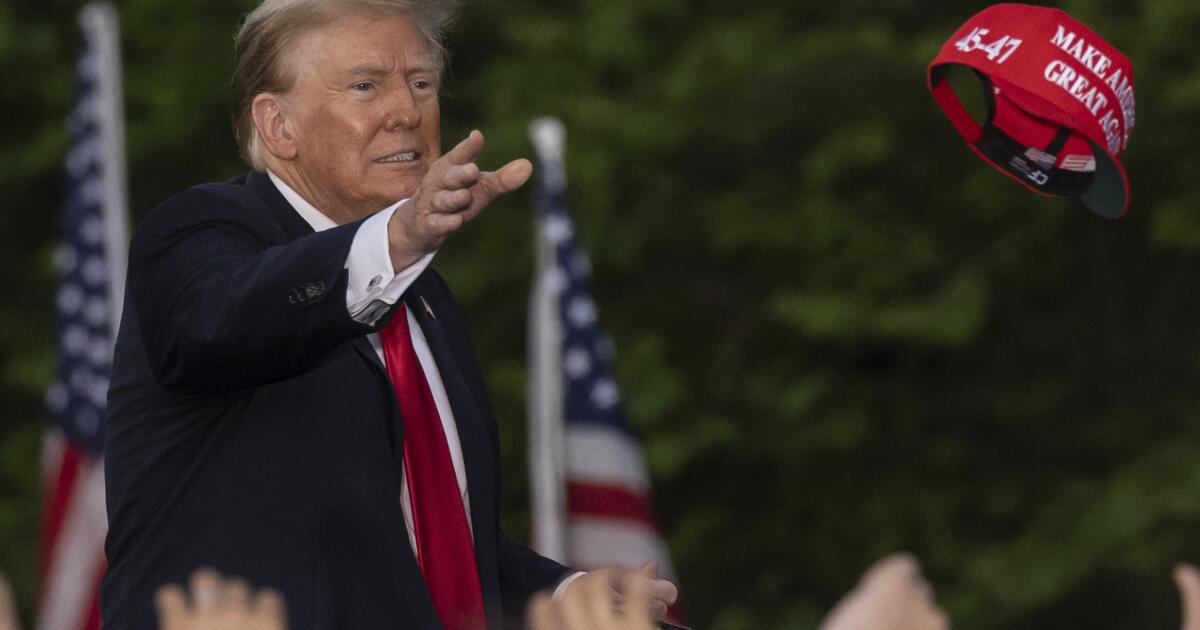
Donald Trump’s supporters often say they admire him because he always speaks his mind.
“He’s brutally honest,” Larry Faria, a Trump fan in the San Joaquin Valley, told my colleague Jeffrey Fleishman in March. “His abrasiveness got him elected.”
But on some topics, Trump can be as slippery as an eel.
The presumptive Republican nominee has refused to be pinned down on abortion, Obamacare and the federal budget.
Let’s start with abortion. In 1999, Trump described himself as “very pro-choice.” Once he decided to run for president as a Republican, he declared himself anti-abortion, and he took credit for putting judges on the Supreme Court who overturned abortion rights in 2022.
But when it comes to federal action to ban or limit abortion, Trump has waffled — apparently because he knows any firm position would be unpopular with a big chunk of the electorate. He has warned others in the GOP that tough abortion policies would lose elections.
In March, Trump found what he hoped was a safe harbor. He declared that since the Supreme Court had put abortion in the hands of the states, a presidential candidate didn’t need to take any position at all.
“It’s up to the states,” he shrugged.
Problem solved? Not exactly. The federal government still regulates the two drugs used for medication abortions, which account for more than half of abortions. Anti-abortion groups want the Food and Drug Administration to withdraw its approval for one of the drugs, mifepristone; some also want the Justice Department to ban the shipment of both drugs through the mail.
Last month, a reporter for Time magazine asked Trump where he stood on those questions.
“I will be making a statement on that over the next 14 days,” Trump replied. “I feel very strongly about it. I actually think it’s a very important issue.”
That was April 12, more than six weeks ago.
Last week, I asked Trump’s campaign if he will be announcing his position on mifepristone soon. Aides did not reply.
Meanwhile, a television reporter in Pittsburgh asked Trump if he supports any restrictions on contraception.
“We’re looking at that, and I’m going to have a policy on that very shortly,” the candidate responded.
That was a mistake, and Trump quickly posted a statement that he “will never advocate imposing restrictions on birth control.”
Aides said the candidate thought he was being asked about mifepristone, on which he still doesn’t have a position. A senior moment, perhaps?
Now, Obamacare — the federally funded health insurance program known formally as the Affordable Care Act. Trump tried to repeal the ACA when he was president in 2017 but failed. He still denounces the program vigorously.
“Obamacare Sucks!” he declared in a social media post last year.
But when Democrats said they looked forward to campaigning against him on the now-popular law, the former president backpedaled.
“I’m not running to terminate the ACA,” he posted. “We’re going to make it much better.”
But he has offered no proposals for improving the ACA.
Last week, I asked Trump’s campaign if he will be unveiling any proposals for improving Obamacare. There was no reply.
Finally, taxes and the federal budget. Two weeks ago, at a rally in New Jersey, Trump made a sweeping promise: big tax cuts for everybody.
“I’ll give you a Trump middle-class, upper-class, lower-class, business-class, big tax cut,” he said. “You’re going to have the biggest tax cut.”
Tax cuts are popular, so you might think a candidate would offer some enticing details.
But Trump doesn’t appear to have an actual tax plan — just a broad promise.
The problem is that tax cuts are expensive, at least under traditional budget rules. Orthodox economics and historical experience teach that lower taxes reduce government revenue and increase deficits. For example, the nonpartisan Congressional Budget Office estimates that Trump’s 2017 tax cuts increased federal deficits by at least $1.8 trillion.
Not only that, a big tax cut would pump money into the consumer economy, which would normally push inflation upward.
Until Trump made his tax-cut pledge, the debate over tax policy focused on current rates, which are scheduled to increase at the end of next year, when the 2017 Trump cuts expire.
President Biden has said he wants to raise taxes on corporations and households earning more than $400,000 a year but leave everyone below $400,000 untouched.
Republicans in Congress say their main goal is making sure taxes don’t go up for anybody, including high-income taxpayers or corporations. They notably didn’t rally around Trump’s expansive promise of new cuts.
Fiscal hawks in the GOP would normally insist on a plan to make sure new tax cuts don’t increase the annual budget deficit and the long-term national debt. Trump has offered no such outline. Without any details, his promise looks like what Silicon Valley calls “vaporware” — an announcement without a product.
Last week, I asked Trump’s campaign if he will offer any more details on his tax cut or other budget plans. Once again, no reply.
There’s a straightforward reason Trump hasn’t clarified his views clearly on these three issues: He doesn’t think it will help him win.
“He’s making the campaign about issues that favor him: the economy and immigration,” Republican strategist Alex Conant explained. “Abortion isn’t an issue Republicans think they can win on. Obamacare isn’t going to decide the election … and voters don’t expect a detailed plan on taxes or the budget.”
And it’s probably good politics.
“He’s actually running the most disciplined campaign he’s ever had,” Conant said. “It’s been mostly gaffe-free, with only a few small exceptions.”
But if Trump wants to be president, he owes voters clearer explanations of his policies on mifepristone, Obamacare and the federal budget. Until he does, it’s time to stop giving him credit for being plainspoken.
He’s candid only when it serves his interest.
Read more Doyle McManus columns on Trump:
Trump has big plans for California if he wins a second term. Fasten your seatbelts
Trump wants to round up over a million undocumented migrants from California. Here’s how he might do it
Trump loves fossil fuels; California wants clean energy. Cue collision
Politics
Kevin McCarthy's ghost is haunting House GOPs' next big legislative fight
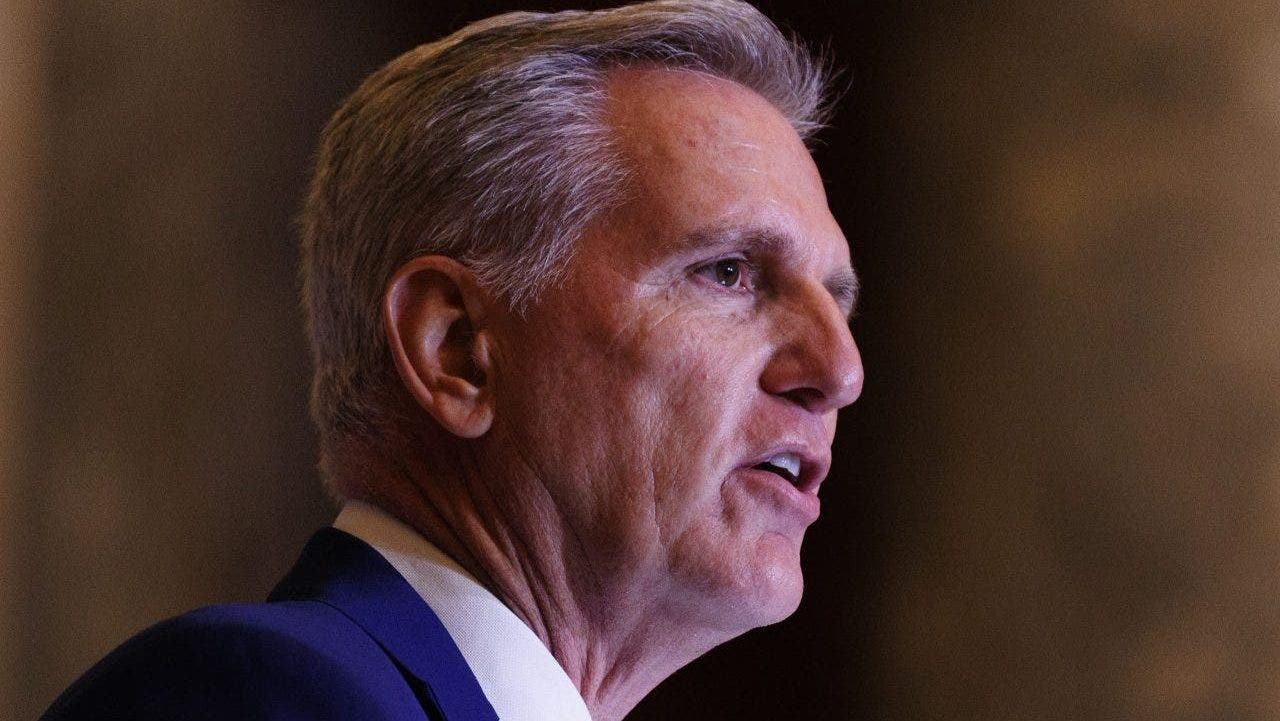
He has been out of Congress for nearly half a year, but the shadow of former House Speaker Kevin McCarthy, R-Calif., is still looming large over the House of Representatives as lawmakers get ready for another intense government funding fight.
Last year, McCarthy agreed to suspend the U.S. debt limit through January 2025 in exchange for federal spending caps for the next two fiscal years, a deal he struck with President Biden called the Fiscal Responsibility Act. Under its terms, discretionary government funding can only grow by 1% in fiscal year 2025.
House appropriators are now wrestling with how to navigate that cap without severely impacting Homeland Security and Defense spending. Fiscal conservatives want negotiators to stick to the statutory cap, which is roughly $1.606 trillion. Defense hawks, meanwhile, are concerned about the effects of a meager increase and worry it could amount to a spending cut on national security when accounting for inflation.
“That was a deal that McCarthy made, right? He’s not here anymore. But our hands might still, legally, be tied to it,” one GOP lawmaker told Fox News Digital.
WHY MEMBERS OF CONGRESS DECIDE THEY ‘GOTTA GET OUT OF THIS PLACE’
Former House Speaker Kevin McCarthy may have left Congress, but his deal with President Biden is still playing a decisive role in the latest government funding talks. (Photo by Aaron Schwartz/NurPhoto via Getty Images)
“I understand what the intent of the FRA was, but… the caps as written prevent us from effectively keeping pace with China. So, whatever is needed between leadership, the Senate and the president to allow us a little more maneuvering space in terms of the allocations between the federal agencies and the 12 bills, I think is necessary.”
Republican Study Committee Chairman Kevin Hern, R-Okla., conceded that “sure” the caps constrained negotiators but urged them to work toward it as written.
“Honestly, I’m having a difficult time figuring out why it’s so hard for us to establish the numbers. I mean, it was agreed to a two-year cap. You know, $1.606 trillion is the number, but it’s like everybody’s struggling to figure out what it really is,” Hern said.
He noted that fiscal year 2024’s government funding level was “a little bit higher” than the agreed-upon $1.59 trillion, thanks to “some sidebar deals that all of us found out about afterwards.”
“But this cap is $1.606, and with no backroom cigar smoke-filled room deals. So we’ll see where my colleague Congressman Cole comes up with the appropriations,” Hern said.
NATIONAL SECURITY HAWKS WARN CONGRESS THROWING PENTAGON ‘UNDER THE BUS’ WITH ‘INADEQUATE’ SPENDING BUMP
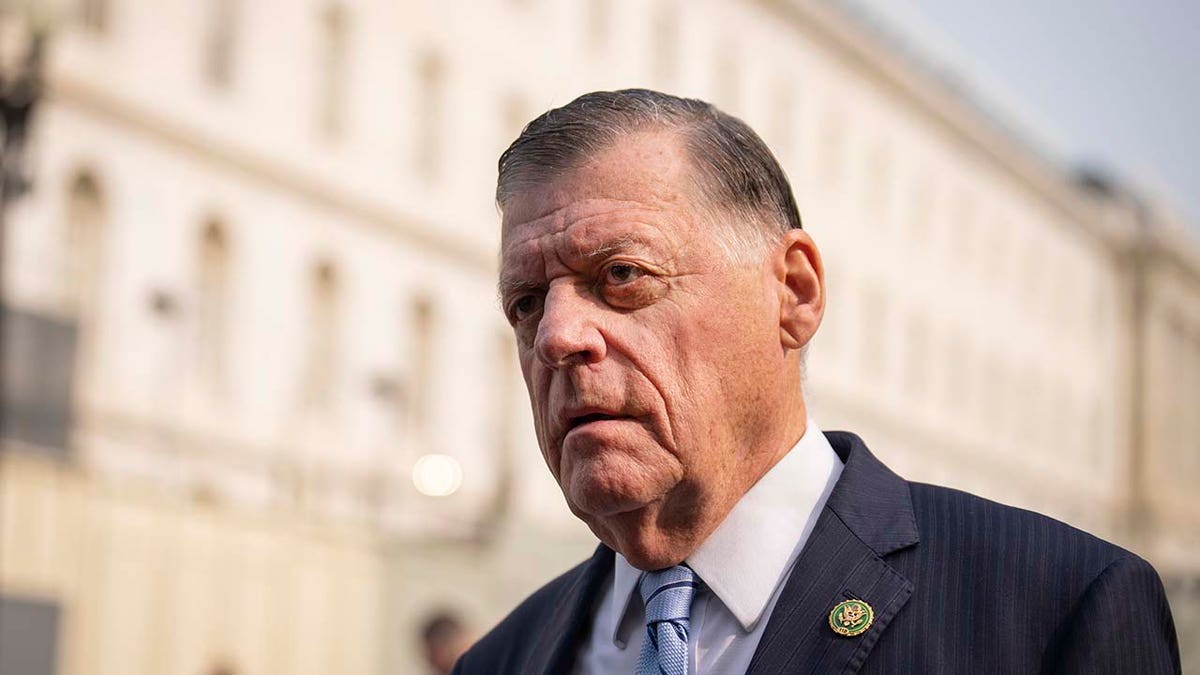
House Appropriations Committee Chairman Tom Cole said the Fiscal Responsibility Act is “the law” when asked if it constrained him. (Drew Angerer/Getty Images)
When asked about whether he felt constrained by the FRA, House Appropriations Committee Chairman Tom Cole, R-Okla., told Fox News Digital, “I mean, that’s the law, so we’re going to mark it up to what the law tells us to mark up to.”
Rep. Jake Ellzey, R-Texas, a member of the Appropriations Committee, similarly said, “We’re doing the best we can, it’s the law of the land. So you do what you can with what you’ve got — if frogs had wings, they’d be a lot more successful on not hitting their rear end when they jump.”
He also suggested that there would be certain hurdles brought by the FRA. “Based on the FRA, most of those bills are going to take a shave except for Defense and Homeland. And of course, even with the increase for those two, it’s a net decrease because of inflation, so real dollars are still getting cut no matter which spending bill you’re talking about,” Ellzey said.
“Chairman Cole has already made some good, hard, strategic decisions…so we’ve got some clear pictures of where we’re going, and we’re going to be far more aggressive on getting those bills done on time this year.”
Indeed, House GOP leaders are eyeing an ambitious schedule to get all 12 individual spending bills that fund the U.S. government passed well before the Sept. 30 deadline at the end of the fiscal year.
SENATE PASSES MAMMOTH $1.2T SPENDING PACKAGE AFTER BRIEF PARTIAL GOVERNMENT SHUTDOWN
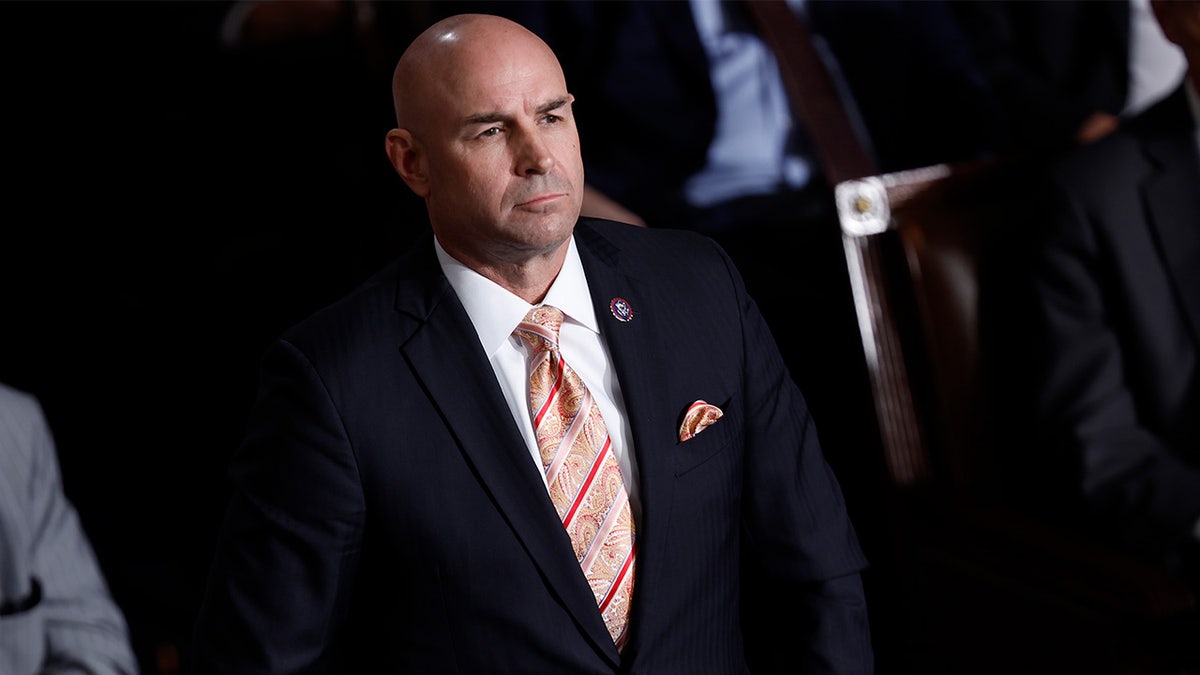
Rep. Jake Ellzey conceded that appropriators were constrained somewhat but expressed confidence in Rep. Tom Cole’s leadership. (Getty Images)
Majority Leader Steve Scalise, R-La., outlined a legislative calendar that would have them passed before Congress embarks on a monthlong August recess during a closed-door House GOP conference meeting earlier this week, a source familiar with his comments told Fox News Digital.
Last year’s government funding fight was marked by chaos and disagreements within the House GOP as members on the right of the conference pushed leaders to leverage a government shutdown in exchange for deeper spending cuts, while other Republicans sounded the alarm on the economic and political ramifications a shutdown would have.
The fight over funding the government in fiscal year 2024 was among the factors that led to McCarthy’s historic ouster last October.
Fox News Digital reached out to a representative for the former speaker for comment.
-

 Politics1 week ago
Politics1 week agoTrump predicts 'jacked up' Biden at upcoming debates, blasts Bidenomics in battleground speech
-

 Movie Reviews1 week ago
Movie Reviews1 week ago‘The Substance’ Review: An Excellent Demi Moore Helps Sustain Coralie Fargeat’s Stylish but Redundant Body Horror
-
/cdn.vox-cdn.com/uploads/chorus_asset/file/24038601/acastro_STK109_microsoft_02.jpg)
/cdn.vox-cdn.com/uploads/chorus_asset/file/24038601/acastro_STK109_microsoft_02.jpg) Technology1 week ago
Technology1 week agoMicrosoft’s Surface AI event: news, rumors, and lots of Qualcomm laptops
-

 World1 week ago
World1 week agoIndia’s biggest election prize: Can the Gandhi family survive Modi?
-

 News1 week ago
News1 week agoA bloody nose, a last hurrah for friends, and more prom memories you shared with us
-

 Finance1 week ago
Finance1 week agoSan Bernardino finance director claims she was fired after raising concerns about costly project
-

 News1 week ago
News1 week agoVideo: A Student Protester Facing Disciplinary Action Has ‘No Regrets’
-

 World1 week ago
World1 week agoPanic in Bishkek: Why were Pakistani students attacked in Kyrgyzstan?












